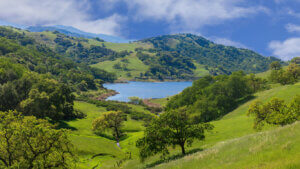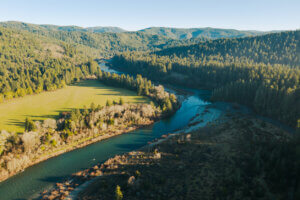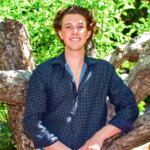Isaac Wallace-Menge is a recent high school graduate with extensive experience researching and volunteering for environmental causes, from coastal restoration to recycling practices. As an advocate for sustainable development, he believes that we can empower future generations to care for the planet through environmental literacy.
Note: This Q&A has been excerpted and abridged from the video interview below.
Describe your work leading environmental action in your community. How did you get involved and how has your experience grown over time?
I was born and raised on a small organic farm, so that gave me a better appreciation for the environment. In high school, I started branching out and getting involved. My first experience was interning for the Santa Cruz Coastal Watershed Council when I was a freshman. In that job, I was managing teams of volunteers to do coastal restoration, river projects, and just cleaning up the environment in general. And then from there, I volunteered for the Monterey Bay Trout and Salmon Project, which is a local organization that’s restoring salmon populations. I also got involved with Save Our Shores, which does beach cleanups.

I also just finished an environmental monitoring project that I’d been working on for the past two years. I had my own research project with two of my peers, where we did a project on methods to remove invasive French broom. I also participated in the honors Student Advisory Board. And this year I wrote a paper talking about how the United States can improve its recycling efficiency, especially now that China’s not buying our recycling.
Why is this issue important to you?
I grew up in the Santa Cruz mountains. The environment is really important to everyone who grows up here because we’ve got the river and the forest and the ocean, all really close by. It’s still pretty pristine, so I think everyone is joined in the fact that they want to preserve that for as long as we can. But there are people who litter and don’t do their part to take care of it. That’s the biggest inspiration for me and most of my peers who work in environmental projects.
What is one of the biggest lessons you’ve learned through your environmental work?
The biggest lesson I’ve learned is that getting environmental projects started and actually making change is much harder than anyone anticipates. Getting everyone on board to help with environmental projects and to actually fulfill them is difficult because the general public and education systems have a hard time adapting. It takes perseverance to keep these things going, but while it’s difficult, it’s really important.
What role do you think education plays in shaping young people to become leaders on climate and social issues?
I think that in every teaching subject, there’s room for environmental literacy. It’s important for teachers to take on an inspirational role, to project some hope and the importance of getting involved, and to promote ways to actually get involved in the community.
I’ve had some teachers that have been really inspirational in the fact that they know of these volunteer organizations that you can get involved in to help the environment. And I think that was helpful in kick-starting my environmental career, as well as those of my peers.
What advice would you give adults based on your environmental leadership experiences?
I would say giving out information and giving resources to the youth. I think the majority of youth are interested in a clean environment, and they want to be able to sustain our Earth for future generations and our generation. But they definitely need the help of adults because they’re the ones that can give them resources and give them the voice to talk about these issues, as well as create their own projects and movements toward saving the environment.
Transitioning to a more sustainable society means building an inclusive movement. What are your thoughts on how to create a more equitable and inclusive environmental movement?
Getting education toward renewable energy and the future of solar jobs for low-income communities is extremely important in making sure that everyone is included in helping the environment, as well as making sure that equality is at the forefront for this nation. In order to actually do something about the environment, we need everyone on board. And I think first getting equality for everyone is the biggest step.
We should join hands with those who aren’t being treated with equality or are being discriminated against. Both movements are equally important, but I think the first step is making sure that everyone feels like they have a voice.
Read more about how California youth are leading the movement for environmental action here.






